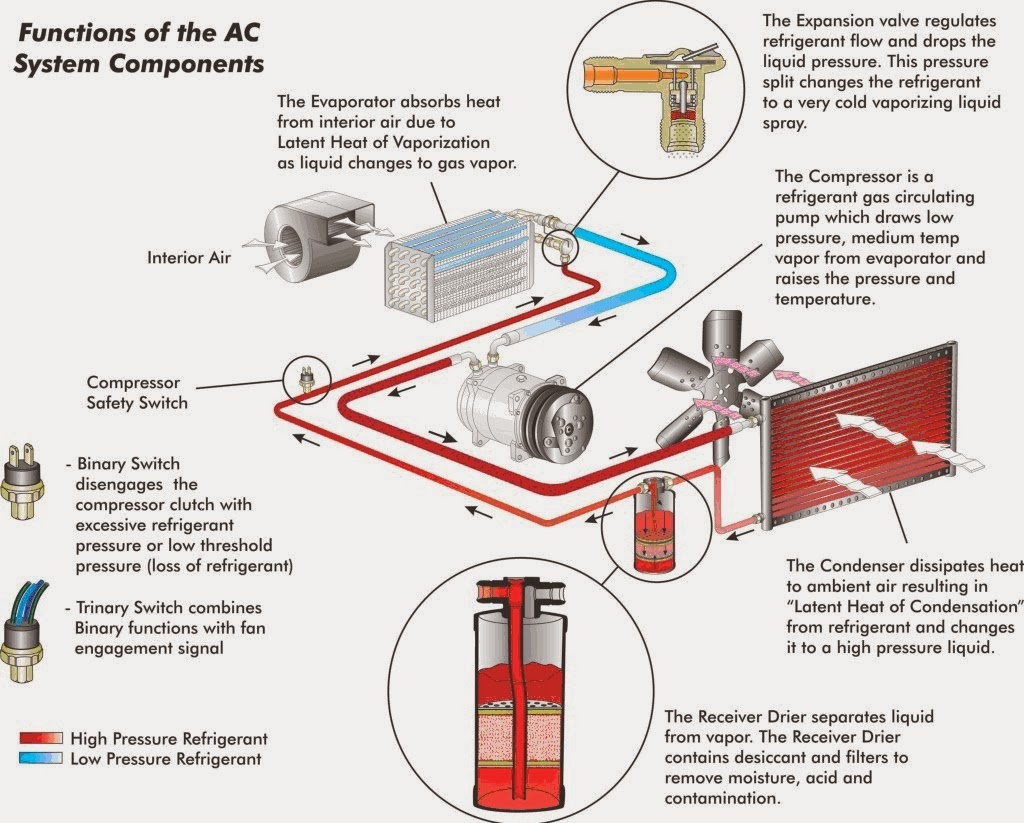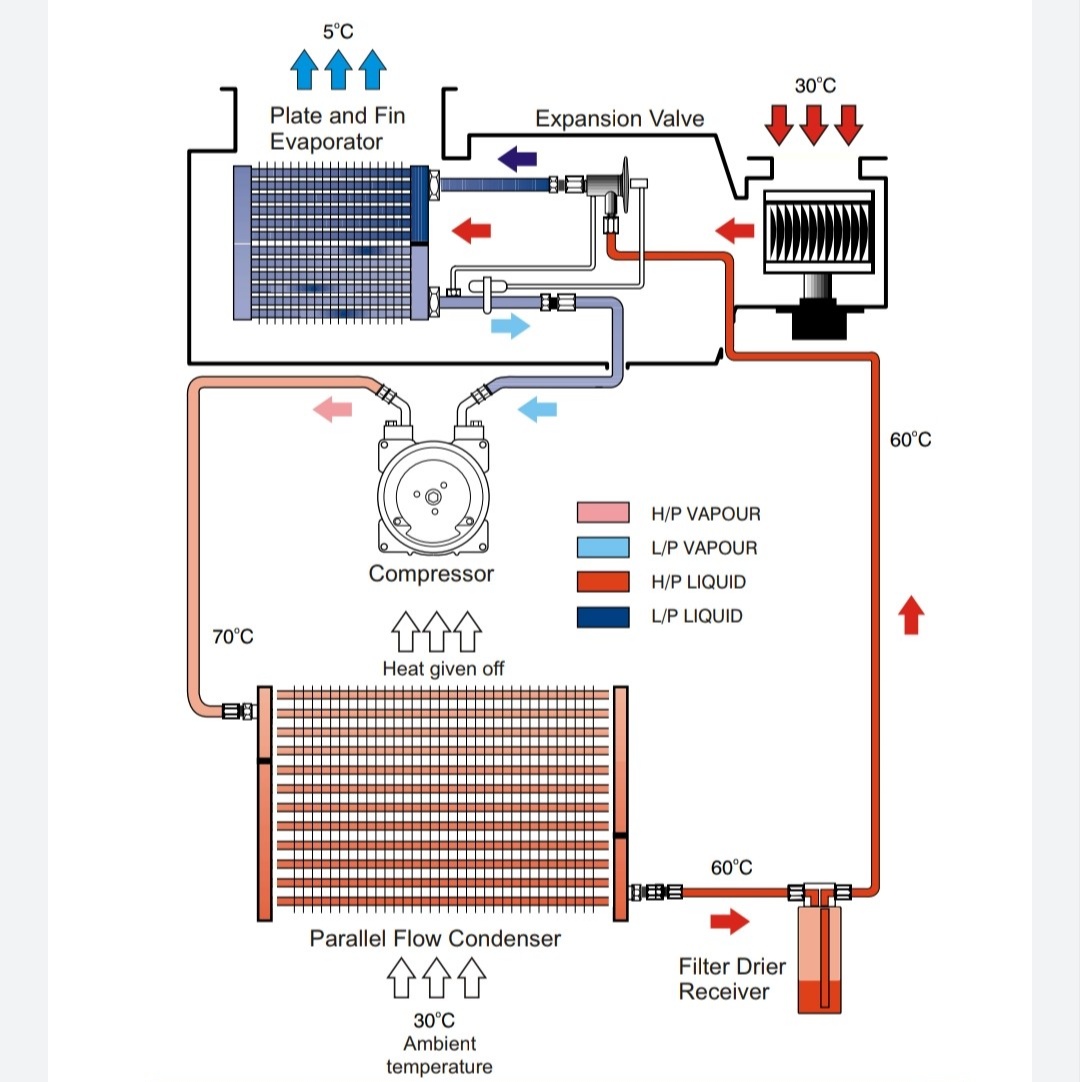Chilling Out: Decoding Your Car's AC System

Sweltering summer day? Freezing winter morning? Your car's climate control system is your best friend, transforming extreme temperatures into comfortable cabin bliss. But have you ever stopped to wonder about the intricate network of car air conditioning components working tirelessly behind the scenes? This article explores the fascinating world of automotive climate control, from its historical origins to modern advancements and essential maintenance practices.
The magic of a comfortable car interior relies on a carefully orchestrated dance between various components. At the heart of the system lies the compressor, the engine of cool air. This crucial component compresses refrigerant, a special fluid, transforming it into a high-pressure, high-temperature gas. This gas then travels to the condenser, which acts like a radiator, releasing heat and converting the refrigerant into a high-pressure liquid. Next, the liquid refrigerant passes through an expansion valve, dramatically reducing its pressure and temperature, turning it into a low-temperature, low-pressure mixture of liquid and vapor. Finally, this chilled mixture enters the evaporator, where it absorbs heat from the cabin air, transforming it into a cool breeze. The cooled air is then circulated through the vehicle's vents, completing the cycle.
The concept of car air conditioning, once a luxury, has become a standard feature in most modern vehicles. The earliest automotive cooling systems emerged in the 1930s, primarily in luxury cars. These early systems were bulky, inefficient, and often unreliable. Over the decades, advancements in technology led to smaller, more efficient, and environmentally friendly systems. Today's car AC systems utilize sophisticated electronic controls, variable displacement compressors, and eco-friendly refrigerants to maximize cooling performance while minimizing environmental impact. These systems are essential not only for passenger comfort but also for maintaining alertness and safety, especially during long drives in extreme temperatures.
A properly functioning car AC system requires regular maintenance. One of the most common issues is refrigerant leaks, which can lead to reduced cooling performance or even complete system failure. Regular checks for leaks, as well as periodic recharging of the refrigerant, are crucial. Other potential problems include clogged filters, faulty compressors, or malfunctioning expansion valves. Regular inspections and servicing by a qualified technician can help identify and address these issues before they escalate into costly repairs.
Understanding the basic function of each component helps diagnose potential problems. For example, if the air coming from the vents isn't cold, it could indicate a refrigerant leak, a faulty compressor, or a problem with the expansion valve. A noisy compressor might signal a need for lubrication or replacement. Regular maintenance, including replacing the cabin air filter and checking for leaks, is essential to keep the system running smoothly and efficiently. Neglecting these simple tasks can lead to more serious and expensive repairs down the road.
Benefit 1: Comfort - Cool air on a hot day or warm air on a cold morning significantly increases driver and passenger comfort. Benefit 2: Safety - A comfortable driver is a more alert driver. Benefit 3: Resale Value - A well-maintained AC system adds to a car's resale value.
Action Plan: Regularly inspect your system, recharge the refrigerant as needed, and replace the cabin air filter. Successful Example: Regular maintenance prevents costly repairs and maintains optimal cooling performance.
Checklist: Check refrigerant levels, inspect for leaks, replace cabin air filter.
Step-by-step guide for replacing the cabin air filter: 1) Locate the filter housing, 2) Remove the old filter, 3) Install the new filter, 4) Close the filter housing.
Advantages and Disadvantages of Modern Car AC Systems
| Advantages | Disadvantages |
|---|---|
| Improved Fuel Efficiency | Environmental Impact of Refrigerants |
| Enhanced Comfort | Potential for Costly Repairs |
Best Practices: 1) Regular inspections, 2) Timely refrigerant recharge, 3) Cabin air filter replacement, 4) Professional servicing, 5) Addressing leaks promptly.
Real Examples: 1) A leaking compressor requiring replacement, 2) a clogged expansion valve restricting refrigerant flow, 3) a contaminated evaporator leading to unpleasant odors, 4) a faulty condenser fan causing overheating, 5) a low refrigerant charge resulting in poor cooling.
Challenges and Solutions: 1) Leak detection - use a leak detector dye, 2) Compressor failure - replace the compressor, 3) Clogged filter - replace the filter, 4) Electrical issues - check wiring and fuses, 5) Low refrigerant - recharge the system.
FAQ: 1) How often should I recharge my car AC? 2) What causes bad smells in my AC? 3) How can I tell if my compressor is faulty? 4) Why is my AC blowing hot air? 5) What is the role of the expansion valve? 6) How do I check my refrigerant level? 7) Is it safe to recharge my AC myself? 8) Why is my AC making noise?
Tips & Tricks: Park in the shade, use sunshades, run the AC on recirculate mode, have the system professionally serviced annually.
In conclusion, the complex system of car air conditioning components plays a vital role in maintaining a comfortable and safe driving environment. Understanding the basic function of these components, from the compressor and condenser to the expansion valve and evaporator, empowers car owners to make informed decisions about maintenance and repairs. Regular upkeep, including refrigerant checks, filter replacements, and professional servicing, can prevent costly repairs and ensure optimal cooling performance. By prioritizing car AC maintenance, drivers can enjoy the benefits of a comfortable cabin, increased alertness, and enhanced resale value. Don't let the summer heat or winter chill get the best of you – invest in your car's climate control system for a more enjoyable and safer driving experience. Take action today to schedule a check-up, ensuring your car's AC is ready for whatever weather comes your way. Your comfort and safety are worth the investment.
Lilac birthday cakes a sweet celebration of color
Exploring michael lee chins financial success
Stunning red nail designs inspiration and ideas













